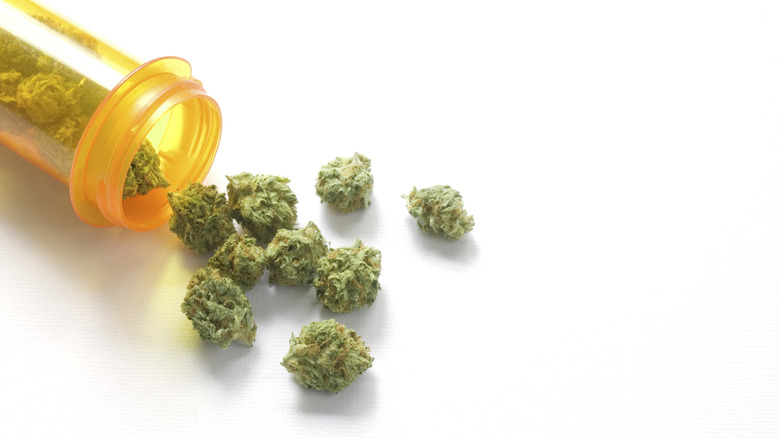What Medical Cannabis Is Doing For People With Chronic Pain
If you've ever lived with chronic pain, you know how frustrating and endless it can feel. Unfortunately, treatment options can be limited, especially when you have to turn to medications like opioids (via Cleveland Clinic). For this reason, many people have been turning to medical cannabis to deal with their chronic pain symptoms, according to a 2023 study published in JAMA Network Open.
Medical cannabis, or marijuana, is legal in 40 U.S. states, as well as the District of Columbia, and Puerto Rico (per NORML). And many people choose to utilize it for relief from chronic pain, which is typically the cause of long-term disability in the U.S. (via Medical News Today). While most cannabis products haven't been approved by the Food and Drug Administration (FDA) and studies are limited, the compounds in marijuana may work to help relieve things like nerve pain and nausea. Tetrahydrocannabinol (THC) and cannabidiol (CBD) both work with receptors in the brain that can relieve pain. While THC is a psychoactive substance that will convey the feeling of being high, CBD does not.
Chronic pain is defined as any pain that lasts for more than three months (per Cleveland Clinic). It can manifest in many different ways, including arthritis, headaches, discomfort near a tumor, nerve or muscle pain, or aching that persists from scar tissue. It can also lead to depression, fatigue, anxiety, and insomnia. Unfortunately, about one in four American adults experiences chronic pain. Luckily, medical marijuana has helped in more than one way.
Nearly one-third of people with chronic pain use cannabis for relief
A 2023 study published in JAMA Network Open found that in states that allow medical marijuana, nearly one-third of U.S. adults with chronic pain have used cannabis to manage their symptoms. Researchers from the University of Michigan and Johns Hopkins University polled 1,661 adults living with chronic pain who live in a state where it's allowed, finding that 31% reported using medical cannabis at some point to treat their pain. Additionally, 23.2% of those polled reported using it in the past month, and 25.9% reported using it in the past year. With that being said, more than half of respondents said that their use of medical marijuana had led to them using fewer prescription opioids and nonopioids, and over-the-counter pain medications.
"The fact that patients report substituting cannabis for pain medications so much underscores the need for research on the benefits and risk of using cannabis for chronic pain," explains the lead author of the study, Dr. Mark Bicket, via a University of Michigan Health press release. While research has been promising so far, studies have been relatively small and short-term. Therefore, larger studies on cannabis use for chronic pain relief are needed.


